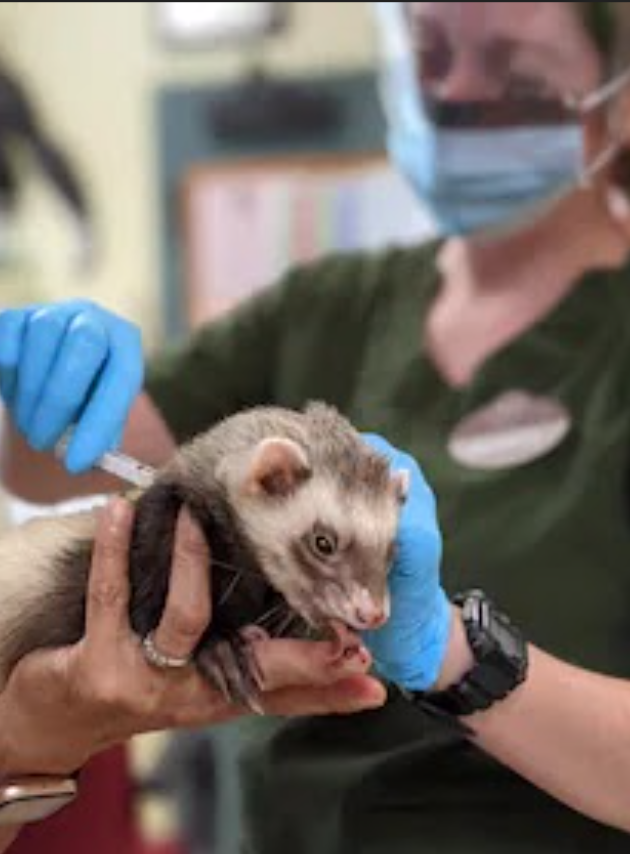Animals in captivity are getting COVID-19 vaccines across the U.S
Archie the ferret receives the Zoetis COVID-19 animal vaccine at Oakland Zoo on July 21, 2021. The tempting vitamin supplement in his keeper’s hand distracts him from the shot.
With a quick jab of the needle, one of the many sea otters residing in the Monterey Bay Aquarium received their COVID-19 vaccine on Wednesday, November 2.
Although the ordeal was over in ten seconds, the otter frantically tried to escape throughout the administration of the dose. “Vaccine-hesitant” took on a very different meaning with “four assistants wearing thick, bite-proof gloves holding the patient on a mat with a duffel bag filled with foam,” (see here).
In the same fashion, zoo animals nationwide have been receiving the experimental COVID-19 vaccine. Among them are hyenas, chimpanzees, and brown bears, all of whom call the Oakland Zoo their home. This sanctuary has given at least one dose of an experimental coronavirus vaccine explicitly produced for animals to 48 animals.
Animals have been lured with treats like ice cream and whipped cream to marshmallows and M&M’s. “For all of our large, exotic cats — that’s lions, tigers and mountain lions — they’re being positively reinforced with goat’s milk sprayed in their mouths,” Alex Herman, vice president of veterinary services at the Oakland Zoo in California, told Matt Blitz from the Washington Post (see here).
And what do these two situations have in common? The Monterey Bay Aquarium and the Oakland Zoo requested vaccines manufactured by veterinary pharmaceutical company Zoetis, a New Jersey company that leads animal drug distribution worldwide.
Demand for doses increased after “news that great apes at the San Diego Zoo became the first zoo animals in the country to receive the vaccines” in February was first reported by National Geographic (see here). Already plenty of research institutions, zoos, and sanctuaries clamored for the vaccines with newfound interest.
Zoetis senior vice president of global biologics Mahesh Kumar says, “The story sparked interest from so many of the other zoos, and that’s what led to our big donation plans.” 11,000 doses of the animal vaccine will be handed out to more than 80 institutions in 27 states free of charge as part of Zoetis’ mission. This will protect zoo animals from becoming increasingly susceptible to the disease because of how close in physical contact they are to humans.
In effect of the urgency zoos and sanctuaries are grappling with, many questions remain. Does the vaccine successfully counter COVID-19 and the Delta variant? Will there come a time when our most loyal companions in the pet dominion need to get their shots?
Significance of vaccinating zoo animals
In April 2020, the first animal that tested positive for COVID-19 on U.S. soil was a tiger at the Bronx Zoo. Two months earlier, the first reported case in a domestic animal was discovered in Hong Kong. Immediately afterward, Zoetis began working on a COVID-19 vaccine for dogs and cats. By October 2020, the company was confident that the doses had positive effects on the two species.
When gorillas at the San Diego Zoo started coughing a few months later, the zoo asked Zoetis about a vaccine for animals. As a matter of fact, the development of one was already underway.
Path to vaccination
The inner workings of the Zoetis vaccine are quite different from the mechanics of the Pfizer or Moderna vaccines. Instead of using messenger RNA, Zoetis utilizes synthetic viral spike proteins made in labs to “trigger the same antibodies the live virus would,” as reported by National Geographic. As of now, zoos have announced side effects even more trivial than that of coronavirus vaccines made for humans.
So far, the U.S. Department of Agriculture has not given commercial approval of vaccines for animals. Kumar finds that minks appear to be the only anomaly due to the contagious outbreaks of the virus on fur farms (see here).
After the vaccines are produced, and case-by-case approval from the USDA and the state veterinarian of the specific zoo is given, Zoetis can commence shipping COVID-19 doses. Kumar adds that “there’s a lot of work,” after supervising the 80 individual zoo agreements and 80 separate requests to the USDA and state veterinarians.
Which animals are eligible?
Little is known about how vaccines affect non-human populations, although some studies (see here) have identified species that are at higher risk, according to National Geographic.
The Oakland Zoo, along with the San Diego Zoo, have both requested vaccines for primates and carnivorans, a group that includes big cats, bears, and otters, as noted by Britannica. Albeit vulnerable to the virus, this area of the animal kingdom has mostly made a full recovery and retains trivial respiratory issues except for two lions in India (see here).
The San Diego Zoo and the San Diego Safari Park have given 266 animals at least a single dose of the coronavirus vaccine. All animals, including those in the Oakland Zoo, do not appear to have any side effects as of now, according to Nadine Lamberski, chief conservation and wildlife health officer at the San Diego Zoo Wildlife Alliance, and Alex Herman, vice president of veterinary services at the Oakland Zoo.
Public backlash
An onslaught of criticism poured in after the Oakland Zoo announced plans to vaccinate a portion of its animals. Anti-vaxxers with tens of thousands of followers on social media escalated the argument by “Saying you’re poisoning your animals, killing your animals,” Erin Harrison, vice president of marketing and communications, stated.
About half of the comments stated, “we’re going to report you to PETA,” as noted by Harrison.
PETA publicized its support of the Oakland Zoo by saying, “These vaccines have been clinically tested and administered to animals only after deep consideration by veterinary professionals. Since growing numbers of big cats, apes, and otters in zoos are contracting SARS-CoV-2—the virus that causes COVID-19—from asymptomatic humans, the evidence clearly indicates that the benefits of vaccination in susceptible species far outweigh the dire risks of infection for unvaccinated animals.”
Archie the ferret.webp caption:
Archie the ferret receives the Zoetis COVID-19 animal vaccine at Oakland Zoo on July 21, 2021. The tempting vitamin supplement in his keeper’s hand distracts him from the shot. (Photo courtesy of Oakland Zoo)
Your donation will support the student journalists of Dublin High School. Your contribution will allow us to purchase equipment and cover our annual website hosting costs.

Audrey joined the Dublin Shield to write about topics that matter to her, raise awareness about crucial issues for youth, and have a creative outlet. As...



































